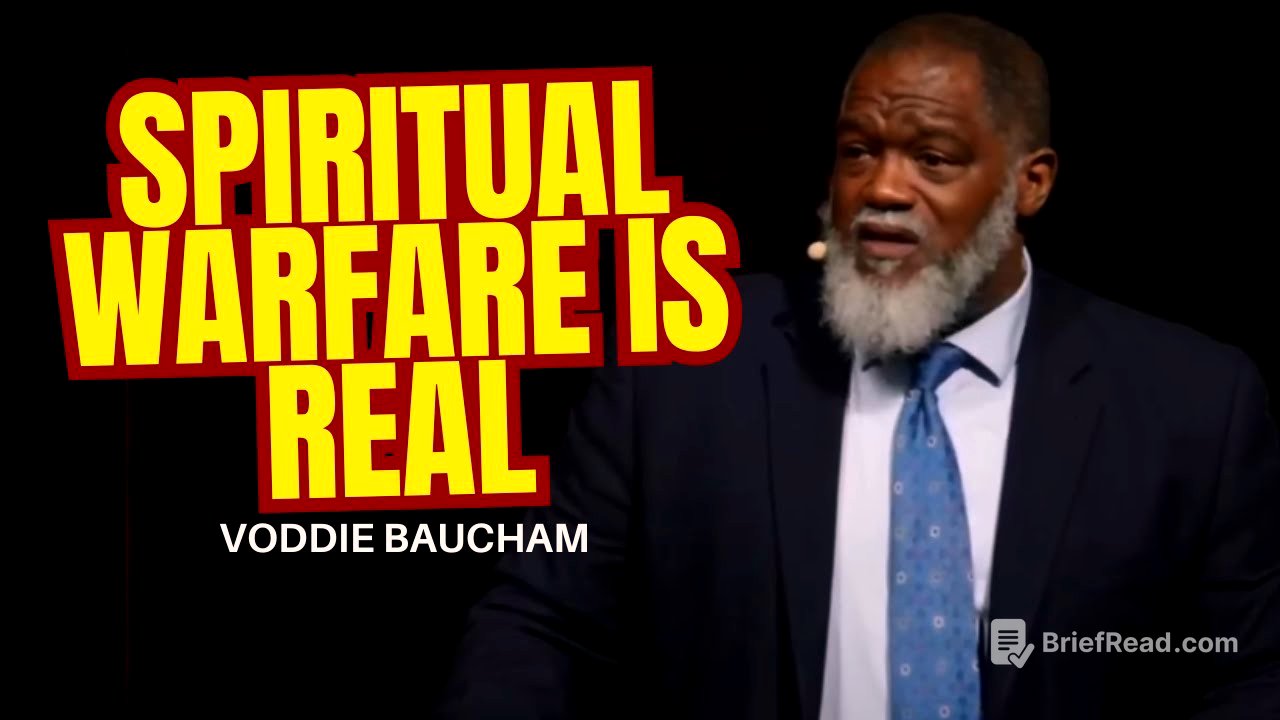TLDR;
This video addresses common misconceptions about spiritual warfare, emphasizing the importance of relying on God's strength and armor rather than personal abilities. It identifies two main errors: underestimating and overestimating spiritual warfare. The speaker argues that the greatest act of spiritual warfare is proclaiming the gospel, which brings people from darkness to light. Additionally, the video refutes the concept of generational curses, asserting that the gospel is sufficient and each individual is responsible for their own sins.
- Avoid underestimating and overestimating spiritual warfare.
- Rely on God's strength and armor, not personal abilities.
- The greatest act of spiritual warfare is proclaiming the gospel.
- Generational curses are not biblically supported.
Introduction: Understanding Spiritual Warfare [0:00]
The speaker opens by stating that the common understanding of spiritual warfare is often flawed, leading to two extremes: underestimating it, living as if there is no spiritual battle, or overestimating it, attributing everything to the devil's influence. He shares an anecdote about a church service where the sound system malfunction was blamed on demonic interference, illustrating the overestimation of spiritual warfare. The speaker emphasizes the need to avoid both extremes and to understand spiritual warfare through the lens of Ephesians 6.
Our Field: Resources, Adversary, and Goal [6:24]
The passage in Ephesians 6 is not meant to instill fear but to provide a framework for understanding spiritual battle. This framework includes recognizing our resources, adversary, and goal. Our resources are God's might and armor, not our own abilities. The speaker stresses that individuals cannot defeat the devil on their own. The adversary consists of rulers, authorities, cosmic powers, and spiritual forces of evil in heavenly places. The goal is to stand firm against these forces, holding our ground rather than trying to charge into battle.
Understanding the Adversary in Heavenly Places [8:45]
The speaker addresses the common fear associated with the idea of spiritual forces in heavenly places. He argues that this fear is misplaced when considering the broader context of Ephesians. The heavenly places are also where believers are blessed with every spiritual blessing in Christ and where they are seated with Him. The wisdom of God is made known to the rulers and authorities in these heavenly places through the church. Therefore, the mention of spiritual forces is not meant to cause fear but to highlight the reality of the battle in God's domain.
Our Fight: Uniform, Weapons, Partners, and Victory [17:21]
Our uniform in this battle is Christ himself, encompassing truth, righteousness, and peace. The weapons include faith (shield to extinguish flaming darts), salvation (helmet), the Word of God (sword of the Spirit), and prayer. The speaker argues that prayer is an offensive weapon, contrary to the common belief that the Word of God is the only offensive weapon. Spiritual warfare is corporate, not individual, and involves making supplication for all the saints.
The Power of Corporate Warfare and Proclamation of the Gospel [24:34]
Ephesians 6 is not about individual battles against the devil but about how God defeats the adversary through the church corporately. The greatest act of spiritual warfare is the proclamation of the gospel. This is because God goes behind enemy lines to bring individuals from the kingdom of darkness into the kingdom of light, showcasing them as trophies of grace. This act is more significant than any incantation or attempt to bind Satan.
Addressing Concerns: Demon Possession and Generational Curses [32:01]
The speaker addresses common questions about demon possession and generational curses. He cites Matthew 12:43-45 to explain that casting out demons is not enough; the void must be filled with the Spirit of God through the gospel. He then refutes the concept of generational curses using Ezekiel 18, which states that each individual is responsible for their own sins and will not be punished for the sins of their fathers. The gospel is sufficient to break any perceived curses.
Conclusion: The Sufficiency of the Gospel [40:34]
The speaker reiterates that the greatest act of spiritual warfare is the proclamation of the gospel, leading to souls being brought from darkness into light. The greatest trophies of this warfare are those who have been saved by grace. This transformation is the most powerful thing in the spiritual realm. The sword of the Lord for warfare is the gospel, and its proclamation is the ultimate victory.









